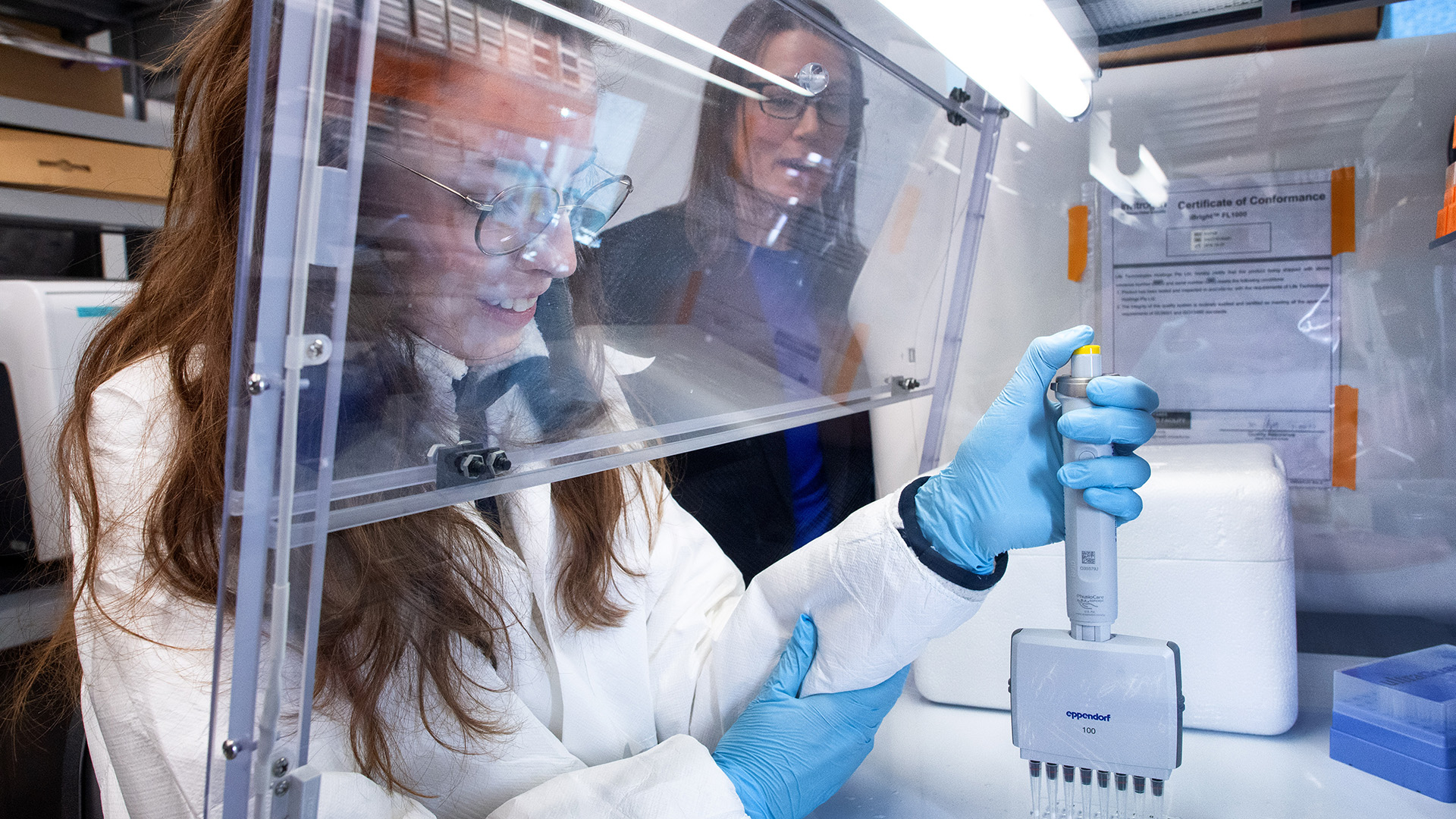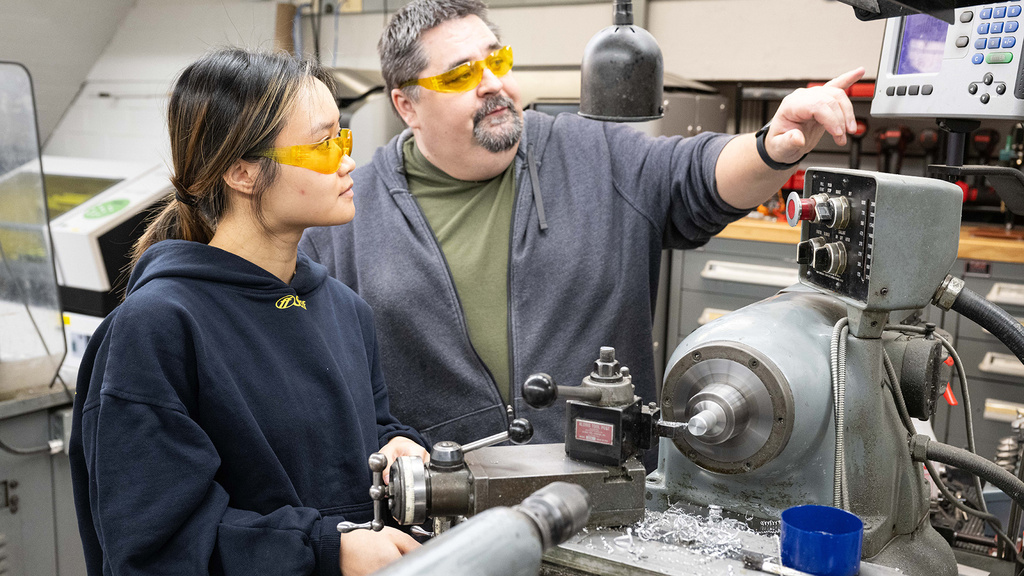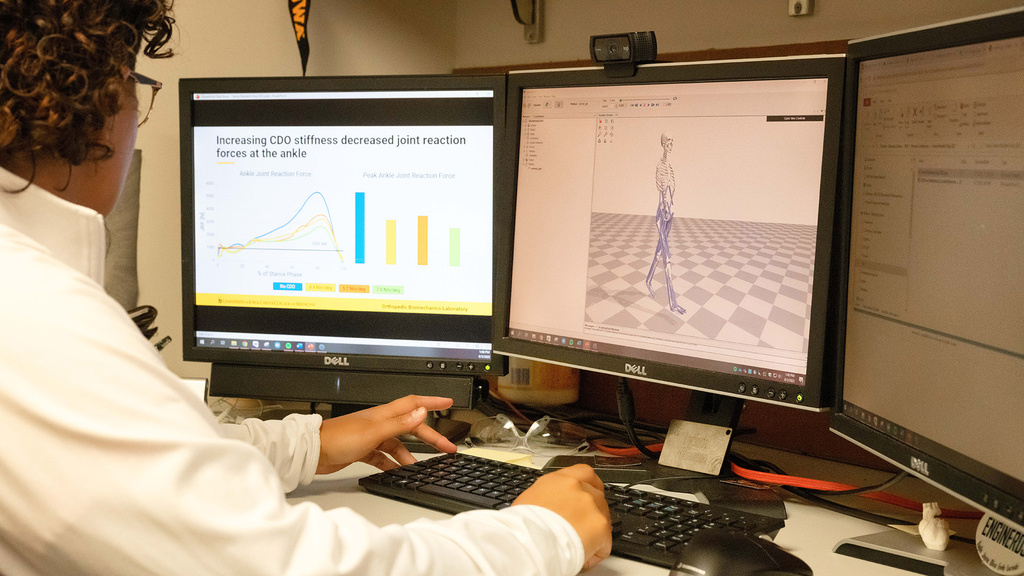Discover the many options a biomedical engineering degree can offer — and then learn how to pursue the one that best matches your interests.
Within the field of biomedical engineering, there are several solid degree paths, each geared to different goals.
Most students start with a bachelor’s degree in biomedical engineering, which builds a core in biology, mechanics, electronics, and computation.
If you’re leaning toward discovery and innovation, a thesis-based MS or a PhD might be the way to go. These programs put you in the lab and set you up for research and development, startups, or academia. Also, some specializations — bioinformatics, medical device research and development, and tissue engineering — either require or strongly benefit from the depth of expertise a doctoral degree provides.
If you’re aiming to get industry-ready skills fast, a professional master’s (non-thesis MS) delivers advanced coursework and design experience, often in flexible or online formats. Another option is the Master of Engineering (MEng), an alternative to the research-based MS. The MEng often requires fewer credits to complete and also offers flexibility in terms of time of day (evenings, weekends), location (in person, virtual), and course load (full time, part time).
Dual-degree options, such as an MD/PhD, are good for students who want to combine clinical practice with engineering innovation, while shorter certificates or minors — in regulatory affairs, data science, or entrepreneurship, for example — can sharpen your edge no matter which route you choose.
What are the types of biomedical engineering?
Biomedical engineering is a broad and interdisciplinary field that is constantly evolving alongside advances in medicine, biology, and technology. This means that there are many types of biomedical engineers, each focusing on a unique area and each employed in a very different job.
Some of the more common types of biomedical engineering include:
- Bioinformatics and computational bioengineering
- Bioinstrumentation
- Biomechanics
- Cell and tissue engineering
- Clinical engineering
- Medical imaging, biomedical imaging, bioimaging
- Rehabilitation engineering
Which field of biomedical engineering is best?
The better question here is, “Which field of biomedical engineering is best for you?”
“Once you’ve decided on biomedical engineering, keep an open mind,” says Nicole Grosland, professor of biomedical engineering and associate dean for academic programs at the University of Iowa. “Think about what excites you. Do you like coding? Mechanics? Biology? These interests will help guide your exploration. Also consider job prospects and whether you want to work in industry, research, or health care.”
The many fields within biomedical engineering give you the flexibility to align your education with your passions and professional goals. Many biomedical engineering programs include focus areas designed to enable their students to acquire in-depth knowledge in their specific area of interest. The University of Iowa, for example, offers four focus areas.
If you don’t immediately know which type of biomedical engineering you want to focus on, that’s OK. Most schools will not make you choose right away. The University of Iowa College of Engineering, for example, doesn’t require you to decide until the end of your fourth semester. That way, you can take a variety of courses to see what areas you like best.
If you do have an idea of the type of biomedical engineering you want to study, make sure the schools you are looking at provide a pathway to do so.
“Biomedical engineering encompasses a broad range of interests, so make sure the school has the resources to support the track that interests you,” says Kelsey Lyons, a University of Iowa biomedical engineering grad and fourth-year student at Georgetown University School of Medicine. “If you’re more inclined to computer science, make sure your program incorporates coding classes. Interested in product development? Make sure there are courses in computer-aided design or access to 3D printing.”

What are the best majors for biomedical engineering?
This should come as no surprise: The best major to become a biomedical engineer is a biomedical engineering bachelor’s degree. This program will equip you with specialized skills at the intersection of biology, medicine, and engineering design.
Majoring in biomedical engineering, however, is not the only path. Interdisciplinary routes can provide competitive advantages by merging biomedical expertise with broader engineering applications. Degrees in mechanical engineering, electrical engineering, or chemical engineering can lead to biomedical careers, particularly when paired with electives or concentrations in biomedical applications. For example:
- Mechanical engineering students might focus on biomechanics or prosthetics.
- Electrical engineering students could specialize in medical imaging or biomedical instrumentation.
- Chemical engineering students often explore drug delivery systems or tissue engineering.
That’s not to say a biomedical engineering degree isn’t flexible. Biomedical engineering programs’ curriculum will prepare you for jobs that require strong analytical skills.
“One skill that every engineer gains is the ability to solve problems,” says Andy Leopold, a University of Iowa biomedical engineering alum who co-founded Medical Murray, a contract development and manufacturing organization for minimally invasive medical devices and implants. “That’s probably a reason you are interested in the field in the first place, right? You love to tinker. You’re methodical about things; you have a process. You will develop and refine these traits in every engineering class you’ll take, and biomedical engineering is no exception. You’ll apply these skills in whatever career you pursue, at whatever job you land.”

Can you get into med school with a biomedical engineering degree?
Absolutely! In fact, a background in biomedical engineering can be an asset in the medical school admissions process.
Biomedical engineering programs are designed to allow students to meet or exceed the typical medical school prerequisites, including coursework in biology, chemistry, physics, and math. With guidance from academic advisors, biomedical engineering students can align their course selections to ensure they are fully prepared for the MCAT and competitive for med school admission.
Beyond meeting basic requirements, a biomedical engineering degree develops the kind of analytical and problem-solving skills that are increasingly valued in modern medicine. Engineering students are trained to think critically, analyze data, and approach complex problems systematically — all qualities that translate well to clinical reasoning and patient care. This blend of technical proficiency and scientific insight helps biomedical engineering majors stand out in the application pool.
Do you have to go to med school to be a biomedical engineer?
Short answer: No.
While educational and regulatory requirements can vary significantly depending on the country and the specific area within biomedical engineering you want to work in, there is no country where a medical degree is universally required to become a biomedical engineer. Most biomedical engineers hold degrees in biomedical engineering; electrical/mechanical engineering with biomedical specialization; or bioengineering or similar STEM fields.
That said, while a medical degree is not a standard requirement for biomedical engineering anywhere, additional health care certification or licensing may be needed for some positions. For those designing or working with implantable/surgical devices, deep collaboration with medical professionals is essential, so having dual degrees can be advantageous.
What is the biomedical engineering salary outlook by degree type?
Salary is often a deciding factor when it comes to graduate school — and in biomedical engineering, a master’s degree can deliver a strong return on investment.
Those with master’s degrees often earn 30% more one year after graduation than their peers with bachelor’s degrees. That increase falls as the years pass, but those with master’s degrees still earn 13% more five years after graduation.
| Degree level | Average median earnings (1 yr post grad) | Average median earnings (5 yrs post grad) |
|---|---|---|
| Bachelor's degree | $54,518 | $96,582 |
| Master's degree | $70,941 | $109,387 |
While you likely will earn more with a master’s degree, it’s important to consider how much you’ll pay to earn that degree. You’ll want to factor that in when deciding whether getting a master’s degree is worth the return on your investment.
A PhD in biomedical engineering can open doors to both academic and industry careers with strong earning potential. Professorships offer stability and intellectual fulfillment, while industry roles may provide higher salaries and faster advancement.
Your choice depends on your goals — whether they lean toward research, teaching, innovation, or leadership.
If you want to teach biomedical engineering at a college or university, your earnings will depend on your experience, institution type, and location.
Iowa’s accelerated path to a master’s
The University of Iowa College of Engineering supports a combined Bachelor of Science in engineering and Master of Science degree program (BSE/MS). The intent of the program is to provide early entrance to grad school and to accelerate time to an MS for our most able students.
Students admitted to this program will be allowed to:
- Apply four engineering courses (12 s.h.) toward the requirement from both the BSE and MS in BME.
- Attend and participate in the BME departmental graduate seminar.
- Conduct innovative research for a master’s thesis or take coursework for a non-thesis master’s starting as early as the summer following junior year.
Tenure/Tenure Track Rank | Benchmark Average | Benchmark Upper Quartile | Benchmark Upper Decile |
|---|---|---|---|
Professor | $197,076 | $212,086 | $237,239 |
Associate Professor | $130,914 | $135,890 | $141,935 |
Assistant Professor | $109,756 | $111,607 | $113,999 |
Source: American Society for Engineering Education, 2024
In industry roles, the average annual salary for someone with a PhD in biomedical engineering can vary. For example, here are some annual salaries included in 2025 job listings requiring a PhD in biomedical engineering:
- Process development engineer at a pharmaceutical company: $105,000–$158,000
- Principal research and development engineer at a medical technology company: $115,000–$197,000
- Senior scientist in regenerative medicine at a health sciences company: $145,000–$185,000
- Biomedical engineering manager for an engineering and scientific consulting firm: $145,000–$197,000
Don’t forget that getting a PhD requires an investment in time and money. How much time and money will depend on how your program is structured (such as tuition and how much financial aid you receive in fellowships, grants, or assistantships) and how long it takes you to complete a PhD.
Related content

Is a master's degree in biomedical engineering worth it?

Is a PhD in biomedical engineering worth it?

